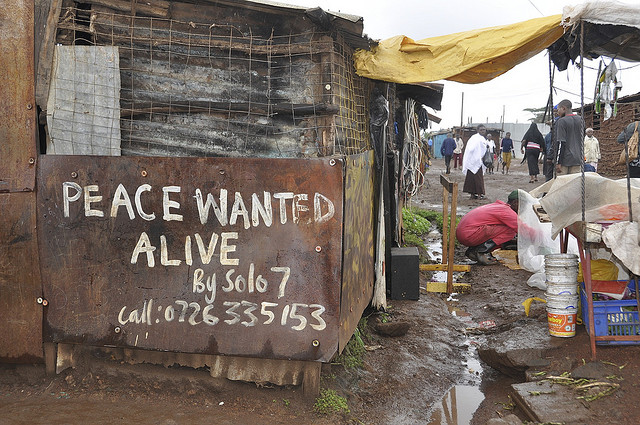"Do we forget peace lessons so fast?"
July 9 Teaching communities to separate politics and violence is a vital part of the peace process, writes Joshua Orawo, 24, a Correspondent from Kenya, but sometimes the lessons are short-lived.
Teaching communities to separate politics and violence is a vital part of the peace process, writes Joshua Orawo, 24, a Correspondent from Kenya, but sometimes the lessons are short-lived.
Following the 2007/08 post-election skirmishes in Kenya which left over 1,200 people dead, approximately 300,000 displaced, several houses, businesses and property looted and destroyed; a myriad organisations were set up with the aim of restoring peace and tolerance among the Kenyan people who had been inflamed against each other by the political class resulting in the said violence.
The organisations – which were mostly donor funded, and whose mandate ran up to last year (after successful polls in March 2013) – went around the country preaching peace, bringing together members of the rival communities and having them promise not just to coexist but to embrace each other.
At the heart of those peace campaigns was the underscoring of the fact that the political class for which the people were ready to kill each other did not have their interests at heart, and that they incited the people for their selfish gain. The people promised to shun tribal politics, and to disparage politicians who attempted to thrive on ethnic profiling and incitement.
I was part of those campaigns. With my colleagues, I went to all parts of the country that were hard-hit by the deadly post-poll brawl. We trained participants on non-violent strategies of engagement. We put on show Mohandas Gandhi’s documentary to convince the participants that they did not have to resort to violence. The campaigns were successful from my assessment. As a matter of fact, the monitoring and evaluation reports revealed that they were indeed successful. We were not alone; a consortium of twenty organisations under the same funding traversed the country with the same message, not to mention other organisations outside our consortium.
More recently however, I have been forced to ask myself what purpose exactly the campaigns we conducted around the country served! What followed the unfortunate Mpeketoni attacks was ethnic profiling and blame-game by the political class as anyone would expect. But what did Kenyans do? They took to the social media, not to scorn the reckless and imprudent statements from the politicians, but to affront and threaten their fellow Kenyans. They took the sides of the politicians from their ethnic communities and promised their perceived enemies havoc. They endorsed the said imprudent statements from the political class!
Then I stop and ask myself; who are the people we engaged on non-violent strategies? Who promised to embrace fellow Kenyans? Are the people some Kenyans are promising mayhem not their fellow Kenyans against whom they promised not to mete violence? Do Kenyans ever learn? Why are poor Kenyans ready to commit heinous crimes and even die for the sake of selfish politicians?
photo credit: worthbak via photopin cc
…………………………………………………………………………………………………………………
About me: A community-mobilizer, youth activist and laws graduate, I am the Executive Director of Intreach Community, a civil society organisation involved in philanthropy for impoverished children and other under-served societal groups. I work towards all inclusive political leadership, where the youth, women and children can voice their concerns without fear and where equality and mutual respect thrive; and a society where fundamental human rights are revered.
…………………………………………………………………………………………………………………
Opinions expressed in this article are those of the author and do not necessarily represent the views of the Commonwealth Youth Programme. Articles are published in a spirit of dialogue, respect and understanding. If you disagree, why not submit a response?
To learn more about becoming a Commonwealth Correspondent please visit: http://www.yourcommonwealth.org/submit-articles/commonwealthcorrespondents/
…………………………………………………………………………………………………………………




